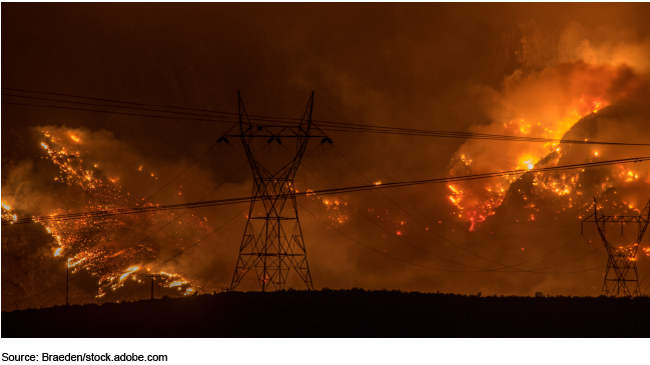Electricity Grid: DOE Should Address Lessons Learned from Previous Disasters to Enhance Resilience
Fast Facts
Power outages caused by natural disasters have affected millions of customers and cost billions of dollars. The Department of Energy plays a key role in disaster response and long-term electricity grid recovery.
DOE has taken some steps to improve its workforce and training, tools and technology, and local capacity to respond to disasters. But, DOE doesn't have a comprehensive plan for coordinating response and recovery responsibilities within the agency. In addition, DOE hasn't used lessons learned from previous disasters to prioritize recovery efforts.
We recommended that DOE create such a plan to address these issues.

Highlights
What GAO Found
In responding to selected disasters occurring between 2017 and 2021, federal, state, and other stakeholders identified lessons learned in the areas of planning and coordination, workforce and training, tools and technology, and local capacity. In the area of planning and coordination, agency officials and reports highlighted that disaster responses were more effective when strong working relationships existed between federal, industry, and local stakeholders. Regarding workforce and training, a Department of Energy (DOE) report emphasized the importance of having a dedicated pool of responders with expertise in grid reconstruction and recovery, especially when responding to multiple, concurrent or successive disasters.
Power Crews Work on Damaged Lines Following a Hurricane in 2020

Federal agencies have taken steps to address lessons learned by improving workforce and training, tools and technology, and local capacity. For example, to address workforce lessons, DOE began deploying a Catastrophic Incident Response Team to quickly bring responders with subject-matter expertise to affected areas. However, DOE does not have a comprehensive approach for coordinating its broader grid support mission that includes disaster response, grid recovery, and technical assistance efforts. Specifically, roles and responsibilities within DOE for transitioning from response to recovery are unclear, as are how lessons learned from previous disasters are used to prioritize recovery and technical assistance efforts. GAO's Disaster Resilience Framework states that bringing together the disparate missions and resources that support disaster risk reduction can help build resilience to natural hazards. By establishing a comprehensive approach that clearly defines roles and responsibilities, and acting on lessons learned across DOE, the department could better target resources and technical assistance. This approach, in turn, can lead to enhanced grid resilience and reduced disaster risk.
Why GAO Did This Study
Natural disasters, such as cyclones, earthquakes, hurricanes, wildfires, and severe storms—and the power outages resulting from these disasters—have affected millions of customers and cost billions of dollars. The growing severity of wildfires and extreme weather events in recent years has been a principal contributor to an increase in the frequency and duration of power outages in the U.S. Federal agencies, such as DOE and the Federal Emergency Management Agency, play a significant role in disaster response, recovery, and resilience.
This report (1) identifies lessons learned from federal, state, and other entities' responses to selected disasters that affected the electricity grid from 2017 to 2021; and (2) examines federal agency actions to address those lessons learned. GAO selected a nongeneralizable sample of 15 of 35 disasters that affected the grid from 2017 to 2021. The 15 selected were among the most severe events across a range of types, locations, and years. GAO also examined agency and industry responses; reviewed relevant reports, policies, and documents; and interviewed federal, state, and local officials, as well as selected industry stakeholders.
Recommendations
GAO is making one recommendation: that DOE establish a comprehensive approach to enhance coordination among its disaster response, grid recovery, and technical assistance efforts, including integrating lessons learned from prior disasters. DOE agreed with GAO's recommendation.
Recommendations for Executive Action
| Agency Affected | Recommendation | Status |
|---|---|---|
| Department of Energy | The Secretary of Energy should establish a comprehensive approach to enhance coordination among its disaster response, grid recovery, and technical assistance efforts, including developing a plan to integrate lessons learned from prior disaster response efforts into the resilience goals of its grid recovery and technical assistance efforts. (Recommendation 1) |
In February 2023, DOE stated that it believes it is already implementing this recommendation, citing a number of mechanisms to coordinate and manage incidents and events across missions, programs, and facilities, and the intent of these efforts includes ensuring the coordination of functions, personnel, procedures, and communications to minimize duplication. However, DOE did not provide sufficient evidence that this coordination incorporates its grid recovery and technical assistance efforts, or that it had identified a plan to establish a comprehensive, DOE-wide approach to enhance coordination related to those efforts. In January 2024, DOE officials stated that it is working with relevant offices to obtain documentation that demonstrates that it has implemented the recommendation. As of January 2025, DOE has not provided this documentation.
|
